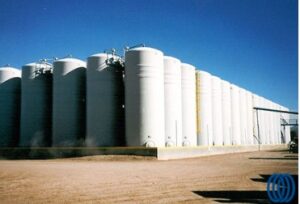Last month we described proper use of a Barcol Hardness Tester to get accurate hardness readings. This month we describe how to interpret Barcol Hardness Tester readings to develop an accurate evaluation of FRP cure.

Be aware that during a test, if the probe contacts a reinforcement fiber near the surface of the FRP, the gauge will read higher than if it had only contacted cured resin. This is especially true for laminates with a high fiber content. A synthetic veil reinforcement might be found in the corrosion liner of equipment intended for use in corrosive service and may cause the Barcol Hardness Tester readings to be 2-3 points lower. Also, normal irregularities in the surface may produce lower readings than if the probe had only contacted resin.

To prevent readings with issues such as the above from true hardness readings, exclude the highest and lowest readings and average the remaining readings. This average hardness is the number to compare to the resin manufacturer’s published hardness number, which appears on the resin manufacturer’s Technical Data Sheet for the resin being tested.
For example, let’s assume you want to know if the cure of an FRP tank has met the resin manufacturer’s specifications. You’ve used a Barcol Hardness Tester properly on the tank and recorded the readings as below:
- Top – 38,36,35,38,38,34,44,36,35,30
- Bottom – 36,36,34,39,38,34,35,36,35,30
- Side – 33,35,28,39,38,34,35,39,35,34
Removing the highest and lowest readings and averaging the remainder:
- Top – 31.5
- Bottom – 35.5
- Side – 35.4
If the average tester readings (as calculated above) in each cluster are higher than the resin manufacturer’s published full cure hardness, then full performance and service life of the FRP equipment can be reasonably expected. In this example, the resin manufacturer specified a hardness of 30 as properly cured, and in all three cluster tests performed above, the averaged readings exceeded 30.
However, if the Barcol Hardness Tester readings are below the resin manufacturer’s published full cure hardness readings, then full cure has not been achieved and full performance and service life of the FRP equipment cannot be expected. In such case, post curing the part with heat applied according to the resin manufacturer’s instructions may increase hardness sufficiently; if that doesn’t work, the FRP equipment may have to be replaced.
Next month we’ll discuss another method of testing FRP cure, Differential Scanning Calorimetry (DCS) analysis.
About Diamond Fiberglass Systems and Services
Diamond Fiberglass Systems and Services has been delivering value to customers since 1986. Diamond manufactures quality, custom-engineered Fiberglass Reinforced Plastic (FRP) tanks and vessels. The company also provides field services that include general maintenance, complex turnaround installations, emergency services, and on-site FRP tank inspections. Facilities are located in Texas and Louisiana. For more information about Diamond Fiberglass Systems and Services, please visit: diamondfiberglass.com, diamondservices.com, and fibrex.com.
About Andronaco
Founded in 1994, Andronaco Industries is a Total Systems Turnkey™ provider for demanding flow control and fluid management applications. Andronaco is unique in its ability to provide field services and to manufacture a broad product line consisting of multiple materials of construction. Products include lined valves, metallic and nonmetallic piping and fittings, expansion joints, hoses, system accessories, pumps, and process and storage FRP tanks and vessels. No other manufacturer in this space brings together end-to-end flow control and fluid management product needs in combination with field services for safe and reliable operations. For more information about Andronaco Industries, please visit: www.andronaco.com.
Total Systems Turnkey™ Approach
Andronaco Industries, supported by Diamond Fiberglass Systems and Services, is a Total Systems Turnkey™ provider for demanding flow control and fluid management applications. Andronaco and Diamond are unique in that we provide field services as well as manufacture a broad product line consisting of multiple materials of construction. Our products include lined metallic and nonmetallic piping and fittings, valves, expansion joints, hoses, system accessories, pumps, and vessels/tanks. No other manufacturer in this space brings together your end to-end product needs in combination with field services for your safe and reliable operations. To learn more about the Total Systems Turnkey™ Approach, please visit: The Total Systems Turnkey™ Portfolio.

